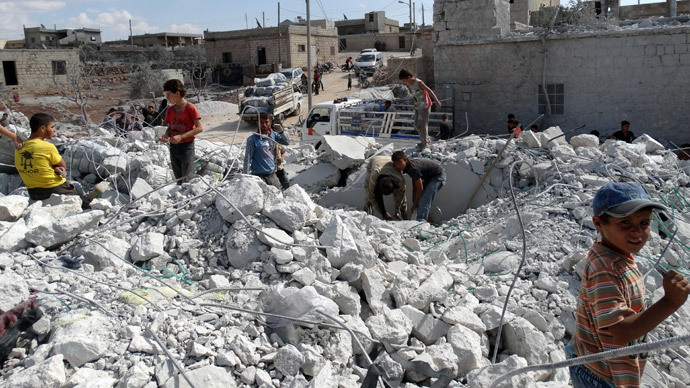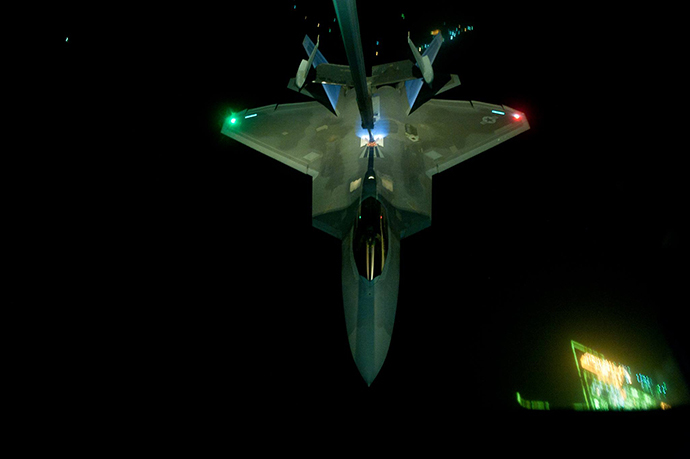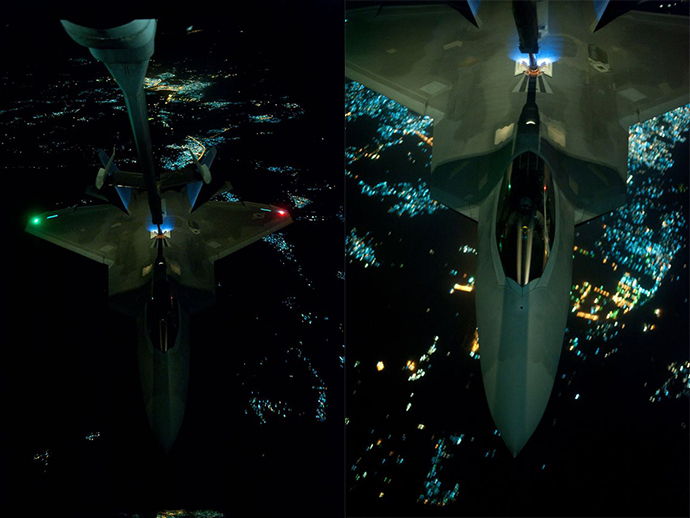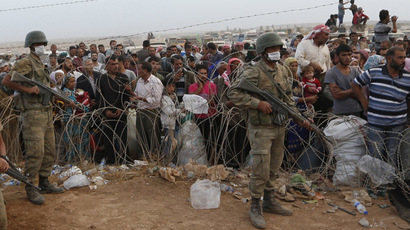By mistake? US-led jets bomb grain silos in Syria, 'civilians killed'

US-led coalition airstrikes destroyed grain silos and other targets in parts of northern and eastern Syria dominated by Islamic State, killing civilians while only wounding ISIS fighters, according to an organization monitoring war in Syria.
The overnight bombings hit mills and grain storage facilities in Manbij, a militant-held town in northern Syria. Coalition forces possibly mistook the structures for Islamic State holdings, said the Syrian Observatory for Human Rights on Monday.
The US military responded to the claims later Monday morning, according to Reuters, saying that Islamic State vehicles were adjacent to the grain storage facility, and that there is no evidence of civilian casualties.
The United States and Arab allies have conducted airstrikes against Islamic State and other jihadist groups in Syria since last week, and in Iraq since last month. The stated goal of the coalition’s bombing campaign is to cripple Islamic State operations, including bases, combat forces, and supply lines. Islamic State, an Al-Qaeda splinter group that reportedly has as many as 30,000 fighters in the region, has come to control large areas of Syria and northern Iraq since the beginning of the Syrian civil war in 2011. The group is also known as ISIS or ISIL.

The destruction of grain silos in Manbij only killed civilians, said Rami Abdulrahman, the head of the Observatory, which claims to have a network of sources throughout Syria.
"These were the workers at the silos. They provide food for the people," he said Monday. Abdulrahman could not offer an exact casualty count.
The airstrikes "destroyed the food that was stored there,” he added, according to AP. Neither Reuters nor AP could immediately verify his claims. The Britain-based Observatory was founded in 2006 and is chiefly opposed to President Bashar Assad’s government in Syria.

Manbij is between the divided city of Aleppo to the west and the northern border town of Kobani, near Turkey, which is controlled by Syrian Kurdish forces. In the pursuit of Kobani, Islamic State offensives have forced tens of thousands of Kurds to seek refuge elsewhere.
The Syrian army - which is not officially allied with the US-led coalition but is aided by any aggression against mutual foes Islamic State - also conducted air raids in Aleppo province Sunday night, hitting spots east of Aleppo city with barrel bombs and other ordnance, the Observatory said. Syrian forces also targeted the western city of Hama.
The US-led bombing campaign also hit an Islamic State controlled gas plant in the eastern Syrian city of Deir al-Zor, wounding many of the group’s members, according to the Observatory. The airstrikes targeted Kuniko gas plant that feeds a power station in Homs that supplies electricity to several provinces and powers oil field generators, the Observatory said.
The United States and allies have said revenue-generating oil facilities held by Islamic State are a priority in the bombing campaign.
The US and coalition forces also bombed areas of Hasaka city in the northeast, as well as areas outside of the northern city of Raqqa, a main territorial stronghold for Islamic State.

The coalition against Islamic State includes Saudi Arabia, Bahrain, the United Arab Emirates, Qatar, and Jordan. Many European countries also are involved with efforts to strike Islamic State group in Iraq, including France, the Netherlands, Denmark, Belgium, and Britain.
If the Observatory’s sources are correct about civilian casualties in Manbij, that would add to the 19 civilians the Observatory has reported have been killed by coalition bombings, according to AP.

Human Rights Watch said Sunday that it confirmed with local residents the deaths of at least seven civilians - two women and five children - from a US missile strike on September 23 in the town of Kafr Derian, of Idlib province. The group said two men were also killed in the strike, but that they many have been extremist fighters.
"The United States and its allies in Syria should be taking all feasible precautions to avoid harming civilians," said Nadim Houry, the deputy Middle East director for Human Rights Watch.
"The US government should investigate possible unlawful strikes that killed civilians, publicly report on them, and commit to appropriate redress measures in case of wrongdoing."














